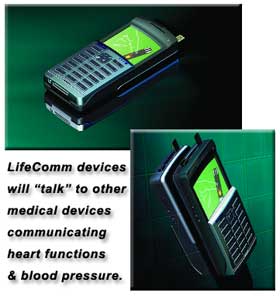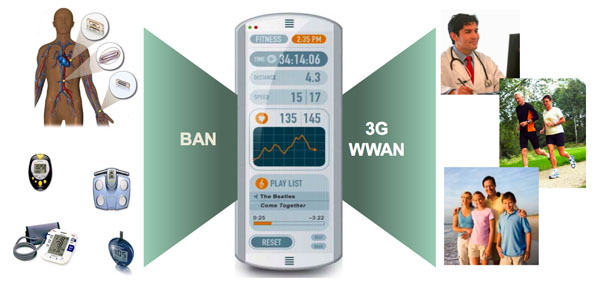It's been more than four years since Qualcomm first announced its plans to help launch a healthcare-focused mobile phone service, called LifeComm. Qualcomm and its (still) undisclosed partners recently decided that it was time to pull the plug on LifeComm after failing to raise additional third party funding, mobihealthnews has learned from an anonymous source.

A circa 2007 mock-up of a LifeComm device
"Qualcomm is reviewing its options with LifeComm in light of current capital market conditions that have prevented LifeComm from raising the third-party capital necessary to fully develop its initial launch product," a Qualcomm spokesperson told mobihealthnews when asked for comment. "Wireless healthcare remains a viable and vibrant space. Qualcomm is committed to this market by supporting its partners to enable wireless healthcare solutions. Qualcomm will continue to work with its partners and industry organizations as we innovate and create technologies for wireless healthcare."
Financing, bridge loans and competitive woes
Qualcomm has been working to establish LifeComm since 2005 but determining the joint venture's ownership structure has plagued the start-up since its conception. In 2007 Qualcomm CEO Paul Jacobs said that the company's launch date had been delayed because Qualcomm did not want to be the main investor in a company that offered wireless services. After all, some of Qualcomm's most important customers are U.S. wireless carriers like Verizon Wireless and Sprint.
In mid-2007 Qualcomm said that LifeComm was weeks away from attaining a bridge loan that would help spin LifeComm out as a separate company. The company then planned to begin hiring an executive team. It wasn't until September 2008, however, that LifeComm appointed Lou Silverman as its CEO. Prior to LifeComm, Silverman spent eight years as President and CEO of Quality Systems, a provider of medical and dental software. Prior to QS, Silverman was COO of CorVel, a provider of medical practice management services. Now that LifeComm is no more, we understand that Silverman is also moving on.
LifeComm's raison d'etre
 LifeComm planned to sell mobile phones equipped with health management applications along with service plans to support the devices. The company's overall goal was to equip the wave of 70 million Baby Boomers that were poised to overwhelm the U.S. healthcare system's already strained medical resources with wireless-enabled tools to help them better manage their own health and fitness. Qualcomm's senior director of business development Paul Hedtke, who was credited as the LifeComm head within Qualcomm, said LifeComm's aim was "to transform our phones into ‘in-the-hand' toolsets that can help us maintain our good health or manage a condition we may already have." The company planned to market its products to both consumers and self-insured employers who might offer the devices to employees as a way to keep health insurance rates down.
LifeComm planned to sell mobile phones equipped with health management applications along with service plans to support the devices. The company's overall goal was to equip the wave of 70 million Baby Boomers that were poised to overwhelm the U.S. healthcare system's already strained medical resources with wireless-enabled tools to help them better manage their own health and fitness. Qualcomm's senior director of business development Paul Hedtke, who was credited as the LifeComm head within Qualcomm, said LifeComm's aim was "to transform our phones into ‘in-the-hand' toolsets that can help us maintain our good health or manage a condition we may already have." The company planned to market its products to both consumers and self-insured employers who might offer the devices to employees as a way to keep health insurance rates down.
A sneak peek at LifeComm devices
Chances are, however, that some of the devices and services that LifeComm planned to bring to market will become commercially available despite the company's disintegration.
Clint McClellan, senior director of business development of health and life sciences at Qualcomm, gave attendees at a recent wireless health event a sneak peek at two products he said LifeComm would bring to market shortly after its launch: a blood glucose monitor-equipped phone and a wireless-enabled medallion, which could send out alerts before the wearer falls.
McClellan described the medallion as similar to those worn by seniors in case they fall down and can't get up, except the Lifecomm medallion would have had an accelerometer embedded that can detect a fall. The medallion was set to include the guts of a "full mobile phone," McClellan said. Think "Lifeline-on-steroids," he quipped.
Mobihealthnews had previously reported on LifeComm's planned medallion offering, which had also been described as a smart mobile PERS (Personal Emergency Response System) system. By adding cellular technology to the PERS, LifeComm looked to extend wireless coverage of the device both into and out of the home, versus legacy products that only had in-home coverage. The medallion also included geo-location capabilities so caregivers could locate wearers should they become lost.
LifeComm also reportedly had plans to offer devices and services designed to help users manage chronic conditions like asthma but also applications aimed to help users maintain wellness and fitness levels in spite of the effects of simple aging. Qualcomm representatives have previously noted that some LifeComm devices might include biosensors or wireless-enabled "Band-Aids" that feed vital signs to the user's phone.
Qualcomm's other wireless health start-ups
Of course, Qualcomm has other wireless health irons in the fire. The company's venture arm has made investments in a number of wireless health companies, besides LifeComm, including Chealcomm and Triage. The company was also instrumental in the launch of wireless cardiac monitoring company, CardioNet, which went public last year. Qualcomm also has close ties to Proteus Biomedical, MicroCHIPS and Isis, but has not made an investment in those companies.
Related:
Qualcomm: LifeComm to offer glucometer phone, medallion














